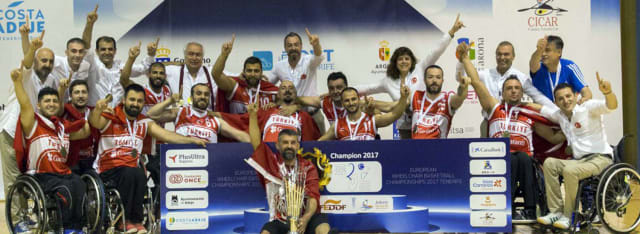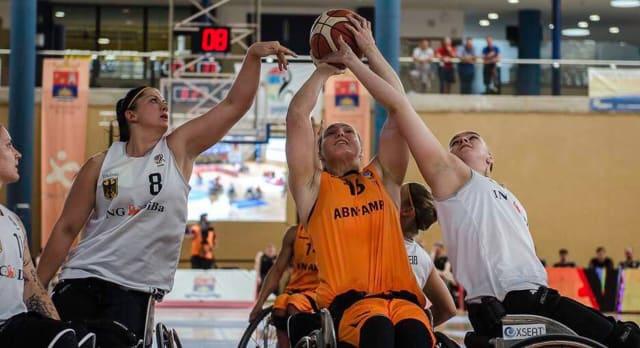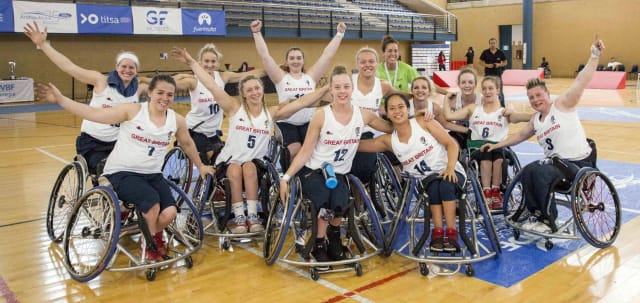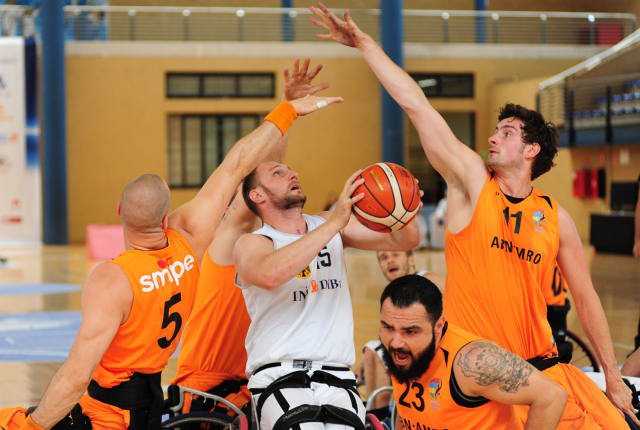Turkey brexits GB's run as Euro kings – Dutch women take back title from Germany
CHARLOTTE (Steve Goldberg's Wheel World) - The IWBF European Wheelchair Basketball Championships are nothing if not traditional, and form held, to a certain point, in Friday's medal games in Tenerife.
CHARLOTTE (Steve Goldberg's Wheel World) - The IWBF European Championships are nothing if not traditional, and form held to a certain point, in Friday's medal games in Tenerife. Great Britain's men met Turkey in a third straight final and fourth in the last five tournaments.
But when I say traditional, nothing quite reaches the consistent rivalry of the German and Netherlands women's teams. The two squads have met in 14 straight European finals since 1989, which is all but the first two since women's competition began in 1974 (and for whatever reason wasn't played again until 1987).
GOLD MEDAL GAMES
Though a regular in the men's final, for the first time Turkey's men emerged victorious, finally adding gold to their three silver medals with a 76-69 win over the reigning three-time kings of Europe.
The silver medal gives the Brits 15 and the lead in total European medals (6 gold, 5 silver, 4 bronze), one more than France (7 gold, 4 silver, 3 bronze).
The Turks, who had defeated GB 71-60 in the final game of group play on Monday, never trailed in the final and pushed to double figure leads throughout the match only to see the team who beat them in the Rio Paralympic bronze medal match keep coming back.
Down by 9 after three quarters, GB went on a 12-5 run, 7 coming from from Terry Bywater, to cut the Turkish lead to 2 (63-61) with 4:05 to play. But Turkey would not falter, outscoring GB the rest of the way 13-8 behind their stalwarts, Özgür Gürbulak, Ferit Gümüş, and Cem Gezinci.
 Turkey celebrates its first-ever gold medal in the IWBF European Wheelchair Basketball Championships. They have won three silver medals. (Photo courtesy of Euro17)
Turkey celebrates its first-ever gold medal in the IWBF European Wheelchair Basketball Championships. They have won three silver medals. (Photo courtesy of Euro17)
Gürbulak led Turkey with 25 points, 6 rebounds and 12 assists. Gümüş had only 8 points, shooting a dismal 1-10 from the field, but was on target from the free throw line in the clutch, hitting 6 of 8, three of those in the last 16 seconds to seal the win.
Gezinci scored 14 and Selim Sayak, who had averaged less than 4 points per game throughout the tournament, added 13.
Bywater led the Brits with 20 points and 8 rebounds. Abdi Jama added 15, with Gaz Choudry and Philip Pratt scoring 11 apiece.
Perhaps it was Turkey's tougher path to the final that steeled their will in closing out those final minutes.
They were taken to the limit in a 66-63 quarterfinal win over Italy and trailed Germany with 90 seconds to play before winning 68-64 to make the final.
Great Britain got pushed a little bit but were clearly stronger in besting Poland 96-69 in the quarterfinals and the Netherlands 72-55 in the semifinals.
In the women's gold medal final, the Netherlands repaid a 10-point loss to Germany in the 2015 Euro final in kind with a 56-46 win over the traditional rivals.
Germany had won six consecutive Euro crowns before the Dutch broke through in 2013 to deny the 2012 London Paralympic champions. The Germans regained it in 2015 on their way to Rio where they defeated the Netherlands in semifinal play.
With just six teams on the women's side, they all played each other in the first round and Germany went 5-0, despite big changes on the Deutsche bench and the court after Rio. They overwhelmed the Oranje four days earlier 61-55 behind Mareike Miller's 42 points on 72 percent accuracy.
 The German defense had few answers for the Netherlands Mariska Beijer in the IWBF Euro17 Wheelchair Basketball Championships. (Photo courtesy of Euro17)
The German defense had few answers for the Netherlands Mariska Beijer in the IWBF Euro17 Wheelchair Basketball Championships. (Photo courtesy of Euro17)
The Dutch D changed the narrative in the final, holding Miller to 23 points, hitting only 35 percent of her shots on the day. It was Miller's University of Wisconsin-Whitewater teammate, but opponent in this game, Mariska Beijer who led the Netherlands with 26 points. Bo Kramer added 17.
The Netherlands jumped ahead by 8 after one quarter but Germany drew even at the half. Even at 27 in the third quarter, the Dutch went on a 12-2 run and Germany never got closer than 8 points the rest of the way.
BRONZE MEDAL GAMES
Another continental tradition is Great Britain playing France for third place and they upheld the ritual for the seventh time, including the last five bronze medal games. As is customary, the Brits won for the sixth time in those seven meetings 68-37. It's the tenth bronze for the GB women.
 The British women's team celebrate a bronze medal win over France in the 2017 IWBF European Wheelchair Basketball Championships. (Photo courtesy of Euro17)
The British women's team celebrate a bronze medal win over France in the 2017 IWBF European Wheelchair Basketball Championships. (Photo courtesy of Euro17)
The outcome was not a done deal before the opening tip. When these teams met in the first round, Great Britain scraped by with a 4-point win. Bronze medal games can be fickle as well, especially for a team that had higher aspirations.
"The game we played against France was the game we were searching for this tournament," noted British coach Miles Thompson. "We separated early and we stayed separated through consistent defense. Our offensive efforts allowed us to score nearly 70 points."
Helen Freeman led GB and all scorers with 27 points and added 12 rebounds and 5 assists. Amy Conroy followed with 18 points and 10 rebounds. Marianne Buso led France with 23 points.
 Jan Gans helped lead Germany to a bronze medal in the 2017 IWBF European Wheelchair Basketball Championships. (Photo courtesy of Euro17)
Jan Gans helped lead Germany to a bronze medal in the 2017 IWBF European Wheelchair Basketball Championships. (Photo courtesy of Euro17)
Germany's men split the honors with the Netherlands, winning the men's bronze medal game 61-56.
Aliaksandr Halouski led the German attack with 25 points and 14 rebounds with Jan Gans adding 19 and Thomas Böhme 12. Mattijs Bellers had 19 points and 12 rebounds for the Dutch followed by Mustafa Korkmaz's 15.
"It was the exciting and tight game against the group-winner and we wanted to have this medal," said German coach Nicolai Zeltinger. "We have such a young team that has done so much and we are so happy that we could get them. That was an incredible team performance."
Steve Goldberg
FIBA
FIBA's columnists write on a wide range of topics relating to basketball that are of interest to them. The opinions they express are their own and in no way reflect those of FIBA.
FIBA takes no responsibility and gives no guarantees, warranties or representations, implied or otherwise, for the content or accuracy of the content and opinion expressed in the above article.
To help make this column as inclusive as possible, please send any national or international event information, story suggestions, or comments to wheelworldmail@gmail.com.